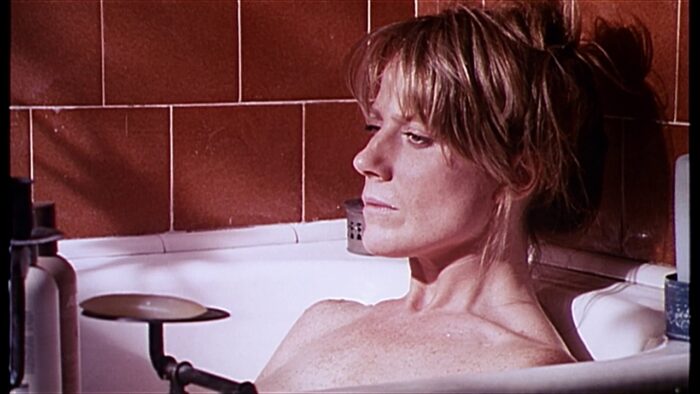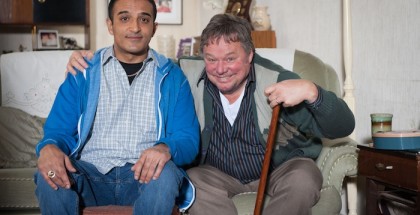Empathy and underdogs: Andrea Arnold’s early short films
Review Overview
Direction
9Humanity
9Acting
9Laurence Boyce | On 13, Feb 2022
The documentary Cow would seem to be something of an outlier within Andrea Arnold’s body of work, as it appears markedly different from the social realistic drama with which the British director has made her name. Yet, as three of her early short films are released on MUBI to coincide with the release of Cow, it’s apparent that one of the most prevalent themes that runs throughout her oeuvre is that of empathy for people (and animals) whose experiences are often marginalised and ignored.
Milk (1998) is Arnold’s debut film and focuses upon Hetty (Lynda Steadman) who suffers a miscarriage. Deciding not to attend the funeral, she staggers around the town in something of a daze when she has a chance meeting with Martin (Lee Oakes). Despite their markedly different backgrounds, they embark on a joyride, forming an unlikely connection.
As Milk begins, it seems that it will be a fairly formal drama – hitting all the right emotional buttons as we explore the grief of a well-to-do middle-class couple in the wake of personal tragedy. But Arnold consistently reframes traditional tropes and the film shifts its focus as the unlikely pairing of Hetty and Martin begins to develop. While touching upon class divide – through the character of Martin, the film shows some reflection of a UK still reeling with the after-effects of Thatcherism – Milk is an unsentimental exploration and critique of notions of femininity and how the state of motherhood is often afforded a sense of beatification – even if that is unwanted.
Arnold confronts the physicality of female existence (the title refers to the fact that Hetty is still lactating) as Hetty confronts both desire and grief head on. Arnold’s claustrophobic camera consistently frames her as lonely and isolated, while adding a touch of the surreal to the realistc within which the film ostensibly occurs. Steadman also gives a restrained performance that has a quiet power and rage.
In Dog (2001), an unnamed girl meets up with her boyfriend as they proceed to a patch of wasteground where he tries to initiate sex. But after a stray dog turns up, his true colours are revealed. Perhaps one of her more despairing and dark works, Arnold shows a world in which poverty is all-encompassing, leaving little room for sentimentality or for escape.
We are firmly in bleak social realist territory: our unnamed protagonist steals money – which is used for her boyfriend’s drugs – from her mother and her mother soon berates her as a “whore”. Yet, while Arnold touches upon masculinity and violence with the shocking act around which the film centres, the film is another exercise in reflecting on the societal role of a woman. Our protagonist is trapped through lack of any material wealth to continue on a path that society has mapped out for her.
However, Arnold never condescends. Hetty’s sexual desire is never frowned upon or criticised (as opposed to our male protagonist’s methods to get it) and her attempt at some kind of agency in the face of violence – and those who are supposed to care for her – gives a glimmer of hope.
Arnold’s Oscar-winning short Wasp (2003) also engages with social realist tropes, but there’s a much more palpable sense of hope among the critique of a society that seems somehow broken. Zoë (Nathalie Press, in a brilliant performance) is a bolshie mother of four young children who reconnects with old flame Dave (Danny Dyer, in an early role). With the prospect of a night out with the man she fancies, she has to offload her kids. But when no one can step in, she must find another way to get what she wants.
Again, Arnold intertwines the political and the personal. Shots of Zoë pouring through a bare kitchen cupboard – only finding mouldy bread and ultimately offering her kids the remains of a bag of sugar to share out – are rife with heartbreak and anger. But there’s also a sense of togetherness amongst the despair (a shot of the family giving the middle finger as one is gloriously cheeky and freeing).
Much like the protagonist in Dog, Arnold doesn’t condemn Zoë for having sexual desires or the need to have a life away from that of being a mother. Instead, it condemns a society in which people are denied that opportunity, often due to poverty – a far cry from right-wing talk of “mothers having babies to become rich from benefits”.
After things come to a head, the film ends on a positive note and there’s a certain amount of energy and freedom. Things may not have changed for good, but there’s also a possibility of respite among the struggle.
Raw and powerful, yet human and empathetic, these three Andrea Arnold shorts are essential to exploring the development of one of the UK’s most celebrated directors.



















